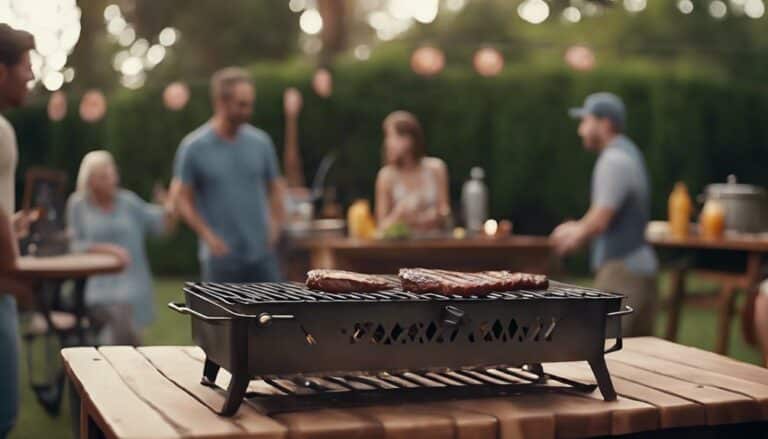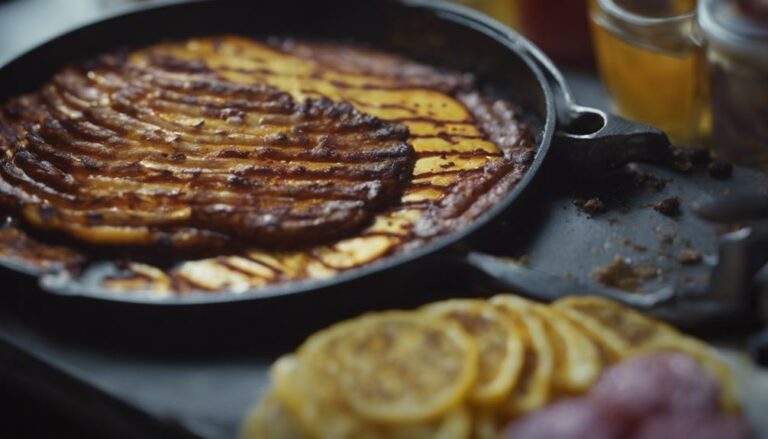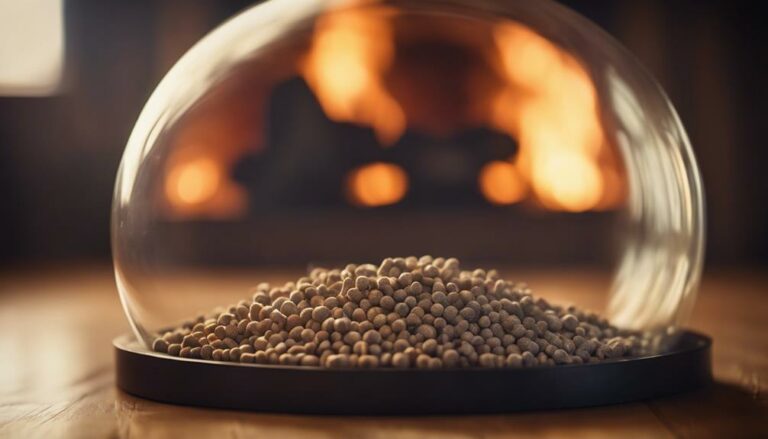Table of Contents
As the summer season approaches, many of us look forward to firing up the grill for some outdoor cooking. However, it’s essential to be mindful of the potential health risks associated with grilling, particularly the formation of carcinogens in BBQ food. By making a few simple adjustments to your grilling routine, you can significantly reduce the presence of these harmful compounds in your meals.
From choosing the right ingredients to adopting safe and effective cooking practices, there are numerous strategies to explore. Let’s explore the key steps you can take to minimize carcinogens in your BBQ food and ensure a healthier grilling experience.
Key Takeaways
- Choose lean meats, fish, seafood, poultry, or plant-based foods for grilling.
- Marinate meat with herbs, spices, vinegar, or citrus juice before grilling.
- Precook meat partially to reduce grilling time and minimize the formation of carcinogens.
- Control grill temperature, flame size, and utilize indirect grilling methods to avoid excessive charring and reduce the production of harmful compounds.
Understanding Grilling Carcinogens
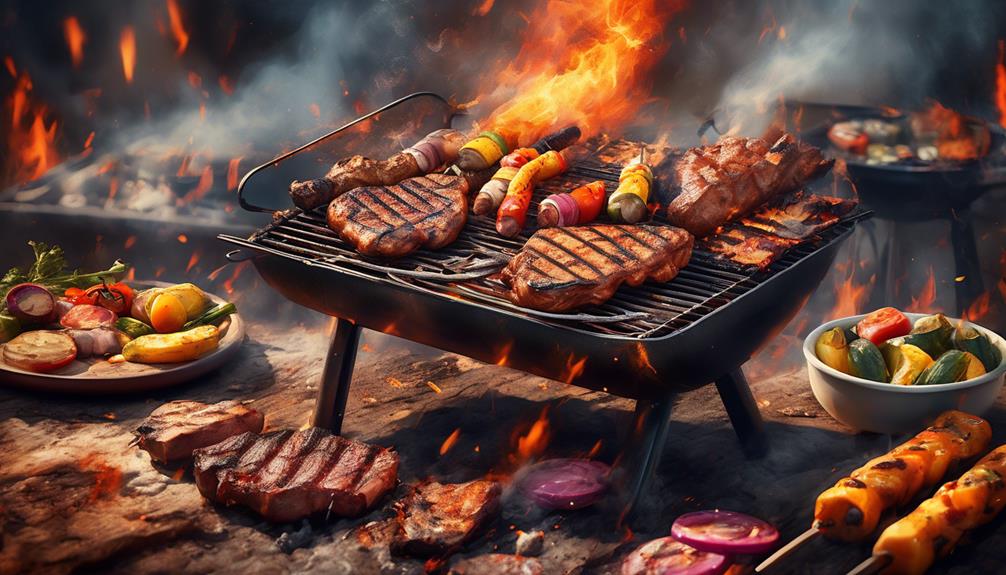
Understanding the formation of grilling carcinogens is essential for making informed choices to minimize the health risks associated with consuming grilled foods.
Grilling safety tips encompass a range of strategies to reduce exposure to cancer-causing compounds, such as heterocyclic amines (HCAs) and polycyclic aromatic hydrocarbons (PAHs).
Opting for fish, seafood, poultry, or plant-based foods over red meat and processed meats can mitigate the formation of these carcinogens.
Additionally, marinating meat before grilling can help reduce the production of HCAs, and experimenting with different marinades and precooking methods can further minimize risk.
Using a meat thermometer to ensure proper cooking temperatures not only safeguards against foodborne illnesses but also helps minimize the formation of HCAs in grilled meat.
Controlling grill temperature and flame is crucial in averting flare-ups and excessive charring, as these can heighten the formation of PAHs and HCAs.
Moreover, limiting the frequency of grilling and considering alternative options such as vegetables, fruits, and plant-based proteins can contribute to reducing exposure to cancer-causing compounds.
Choosing Healthier Grilling Methods
When it comes to choosing healthier grilling methods, one effective approach is to consider direct heat grilling versus indirect heat grilling.
Direct heat grilling involves cooking food directly over the heat source, while indirect heat grilling involves cooking food next to the heat source.
Understanding the differences between these methods can help individuals make informed choices to minimize the formation of carcinogens in BBQ food.
Direct Heat Grilling
For direct heat grilling, selecting lean meats, fish, seafood, poultry, or plant-based foods is a prudent choice to minimize the formation of carcinogenic compounds such as PAHs and HCAs.
To further reduce the risk of carcinogen formation, consider these techniques:
- Marinate meat with herbs, spices, vinegar, or citrus juice before grilling to lower the levels of cancer-causing compounds.
- Precook meat partially to reduce grilling time and minimize the formation of HCAs and PAHs.
- Use a meat thermometer to ensure meat is cooked to the proper internal temperature, reducing the risk of overcooking and the formation of HCAs.
- Control grill temperature and flame to minimize smoke and avoid excessive charring, reducing the production of cancer-related compounds.
Indirect Heat Grilling
To minimize the formation of carcinogens during grilling, choosing indirect heat methods can reduce direct exposure to flames and lower the accumulation of cancer-causing compounds.
Indirect heat grilling offers several benefits, including a reduction in cooking time. By placing the food away from the direct flames, it allows for more even cooking without the risk of charring, which can lead to the formation of carcinogens.
This method is particularly advantageous for larger cuts of meat that require longer cooking times, as it decreases the likelihood of overexposure to high heat.
Additionally, indirect heat grilling is suitable for a variety of foods, including fish, seafood, poultry, and plant-based options, making it a versatile and healthier choice for minimizing the risk of consuming harmful compounds.
Preparing Grilling Ingredients Safely
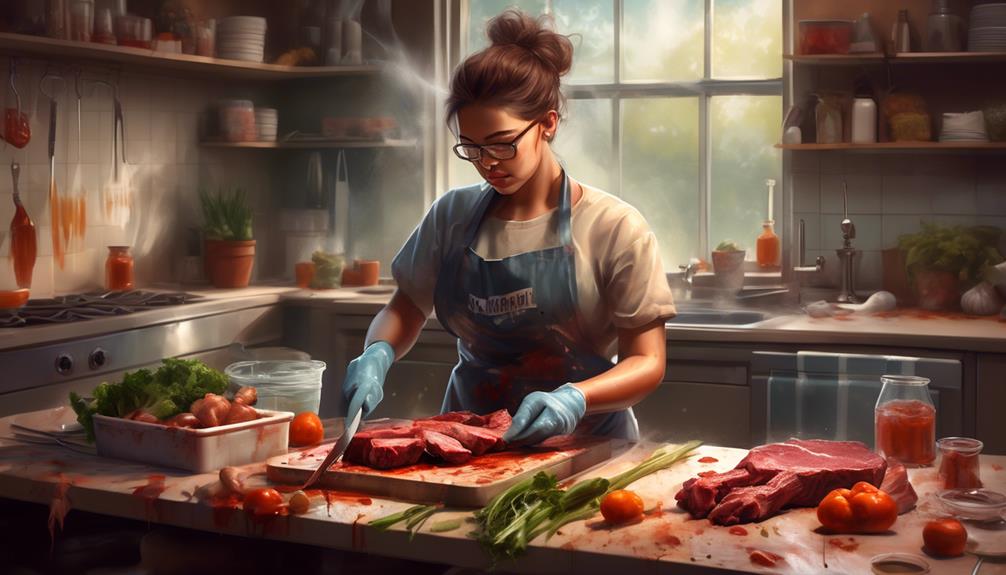
In considering the safe preparation of grilling ingredients, it is essential to adopt strategies that minimize the formation of carcinogens during the grilling process. Here are some grilling safety precautions to consider for reducing carcinogenic compounds:
- Marinate meat before grilling to reduce the formation of HCAs and PAHs.
- Precook meat partially before grilling to minimize the time needed on the grill and reduce the production of HCAs.
- Use a meat thermometer to ensure meat is cooked to the proper internal temperature, reducing the risk of undercooking or overcooking.
- Control grill temperature and flame to avoid excessive charring and flare-ups, which can increase the formation of PAHs.
These precautions not only enhance the safety of the grilling process but also contribute to minimizing the production of harmful compounds in grilled food. By incorporating these measures into the preparation of grilling ingredients, individuals can enjoy BBQ food while reducing their exposure to carcinogens.
Managing Grilling Temperature
To manage grilling temperature effectively, it is crucial to ensure even heat distribution and control the size of the flame. By maintaining a steady temperature and preventing flare-ups, you can minimize the production of carcinogens.
Using a meat thermometer to cook meat to the proper internal temperature also reduces the risk of undercooking or overcooking, contributing to a safer grilling experience.
Even Heat Distribution
A critical factor in minimizing the formation of carcinogens in BBQ food is maintaining even heat distribution throughout the grilling process. To achieve this, consider the following:
- Control Grill Temperature: Even heat distribution prevents excessive charring and reduces the formation of carcinogens.
- Use a Meat Thermometer: Ensuring the meat is cooked to the correct internal temperature minimizes the risk of overcooking and the production of harmful compounds.
- Reduce Flare-ups: Controlling grill temperatures and preventing flare-ups avoids excessive charring and smoke.
- Indirect Grilling: Utilize indirect grilling methods to evenly cook food without exposing it to direct flames, reducing the formation of carcinogenic compounds.
Mastering even heat distribution is crucial in preventing the formation of harmful compounds and achieving a healthier BBQ cooking process.
Controlled Flame Size
Mastering even heat distribution is crucial in preventing the formation of harmful compounds during BBQ grilling. Part of achieving this is controlling the flame size to manage grilling temperature effectively.
Utilizing flame control techniques is essential in reducing charring and smoke, which can lead to the production of carcinogens. Adjusting the grill’s flame to lower levels helps minimize the formation of polycyclic aromatic hydrocarbons (PAHs) and heterocyclic amines (HCAs), which are associated with an increased cancer risk.
Using a meat thermometer to gauge the grill’s temperature ensures thorough cooking without excessive charring. By keeping a controlled flame size, the generation of these cancer-related compounds during grilling can be reduced.
Therefore, it is crucial to lower the flame size and manage the grilling temperature to minimize the production of carcinogenic compounds.
Using Flavorful and Protective Marinades
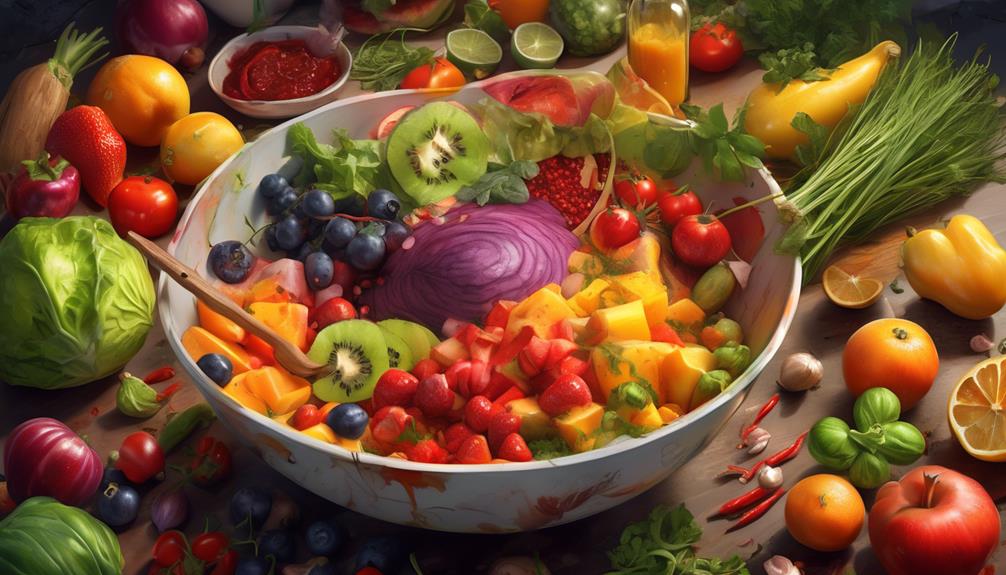
When grilling meat, utilizing flavorful and protective marinades can play a crucial role in minimizing the formation of carcinogens such as HCAs and PAHs, which are associated with an increased risk of cancer. To achieve this, consider the following:
- Marinade Ingredients: Opt for marinades containing herbs, spices, and acidic ingredients like vinegar or citrus juice. Studies have shown that these components can lower the levels of HCAs in grilled food. Additionally, using antioxidant-rich herbs and spices can contribute to the reduction of carcinogen formation.
- Marinating Techniques: Marinate meat for at least 30 minutes before grilling. This process not only infuses the meat with flavor but also helps decrease the level of HCAs. Experiment with different marinades and pre-cooking methods to find the most effective approach for minimizing cancer risks while grilling.
- Alcohol or Acidic Juices: Using marinades with alcohol or acidic juices, such as lemon or lime juice, can be beneficial. These ingredients, along with the antioxidant properties of certain herbs, have been found to effectively reduce the formation of grilling carcinogens.
Grilling Lean and Clean
To promote healthier grilling practices and reduce the formation of carcinogens, choosing lean meats, fish, seafood, poultry, or plant-based foods is recommended. These alternatives not only offer a healthier option but also reduce the formation of harmful compounds during grilling. Additionally, incorporating alternative grilling options such as vegetables, fruits, and plant-based proteins can further minimize cancer risks. Here’s a table to highlight some lean and clean grilling alternatives:
| Lean and Clean Grilling Alternatives | Benefits |
|---|---|
| Skinless chicken breast | High in protein, low in fat |
| Salmon or other fatty fish | Rich source of omega-3 fatty acids |
| Tofu or tempeh | Plant-based protein, low in saturated fat |
| Portobello mushrooms | Low in calories, high in antioxidants |
| Mixed vegetables (bell peppers, zucchini, eggplant) | High in fiber, vitamins, and minerals |
Incorporating these options into your grilling routine not only reduces smoke exposure but also provides a variety of health benefits. Additionally, cleaning the grill regularly and using antioxidant herbs and seasonings can further minimize the formation of harmful chemicals.
Enhancing Grilled Dishes With Antioxidants
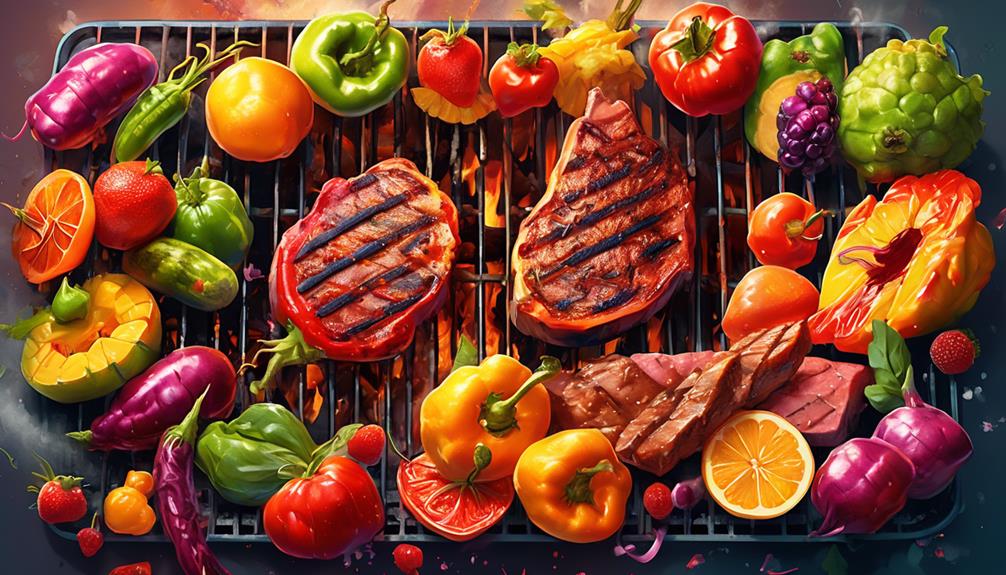
To further optimize the healthfulness of grilled foods and elevate their antioxidant content, incorporating antioxidant-rich herbs, marinades, and a colorful array of vegetables and fruits can be key in mitigating the formation of harmful chemicals and enhancing the overall nutritional profile of grilled dishes. Here are some evidence-based tips to enhance your grilled dishes with antioxidants:
- Use antioxidant-rich herbs and spices like rosemary, mint, basil, and thyme in your grilling marinades to reduce the formation of harmful chemicals.
- Choose marinades with alcohol or acidic ingredients such as vinegar or citrus juice to minimize the production of cancer-causing compounds while adding flavor to your grilled dishes.
- Add colorful vegetables and fruits to your grill to provide essential nutrients and phytochemicals that can help neutralize the effects of potential carcinogens in grilled meats.
- Experiment with grilling antioxidant-rich foods like asparagus, squash, and peppers alongside your meats to enhance the overall health benefits of your BBQ meal.
Incorporating these strategies will not only enhance the flavor of your grilled dishes but also boost their antioxidant content, making your BBQ meal a healthier and more wholesome choice.
Are Barbecue Chicken Recipes Safe from Carcinogens?
When it comes to mouthwatering barbecue chicken recipes, safety is a valid concern. Grilling at high temperatures can produce carcinogens in meat, but there are ways to minimize the risk. Marinating the chicken in herbs, lemon juice, or vinegar can help create a barrier between the meat and the flames.
Safe Grilling Practices
A mindful approach to grilling can significantly reduce exposure to potential carcinogens, thereby promoting safer and healthier consumption of grilled foods. Safe grilling practices involve controlling the grilling temperature and properly marinating meat. The table below outlines key safe grilling practices to minimize the formation of cancer-causing compounds.
| Safe Grilling Practices | Description |
|---|---|
| Choose Leaner Meats, Fish, Seafood, and Plant-based Foods | Opt for leaner protein options to reduce the formation of harmful compounds during grilling. |
| Proper Meat Marination | Marinate meat with herbs, spices, and acidic ingredients to lower the production of cancer-causing compounds. |
| Use a Meat Thermometer | Ensure proper cooking temperature to prevent overcooking and the formation of harmful compounds. |
| Control Grill Temperature and Flame | Minimize smoke, flare-ups, and excessive charring to reduce the production of carcinogens. |
Frequently Asked Questions
How Do You Prevent Carcinogens When Grilling?
To prevent carcinogens when grilling, it’s crucial to control grill temperature and use proper meat preparation techniques. This includes marinating meat, pre-cooking, and using a meat thermometer to ensure safe internal temperatures, minimizing the production of harmful compounds.
How Do You Remove Carcinogens From Meat?
Cooking techniques such as marinating and precooking meat can help reduce the formation of carcinogens. Preparing meat by marinating before grilling and using precooking methods like boiling or microwaving can lower the production of harmful compounds.
Does Marinating Meat Make BBQ Meat Less Carcinogenic?
Marinating meat before grilling has been shown to reduce the formation of carcinogens. This is due to the beneficial effects of the marinade’s ingredients, such as herbs, spices, and acidic components, which can lower carcinogen levels. Experimenting with different grilling techniques and marinades can help minimize cancer risks.
Is Burnt BBQ Food Carcinogenic?
Burnt food, particularly from grilling, can pose a cancer risk due to the formation of potentially carcinogenic compounds like PAHs and HCAs. These compounds are known to be linked to cancer development.
Conclusion
In conclusion, by being mindful of the grilling methods and ingredients, it is possible to minimize the formation of carcinogens in BBQ food.
Choosing healthier options, prepping ingredients safely, managing grill temperature, and using protective marinades can all contribute to reducing cancer risks.
Just as we carefully tend to our grills to create delicious and safe meals, we must also tend to our health with the same level of care and attention.







